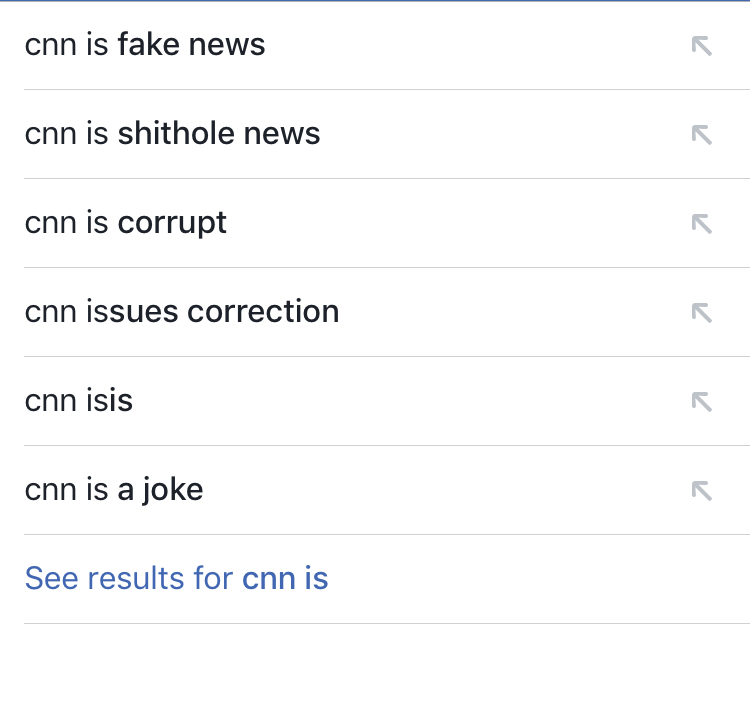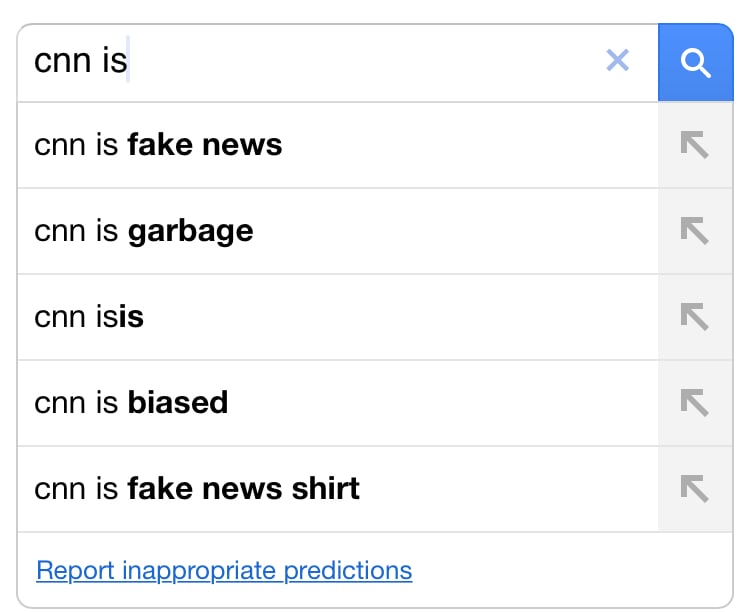Should Search Engines and Social Media Police Their Output
Looking at the claimed biases of Google and Facebook, should these sites police their output for "Fake" news and such similarly labeled publishing?
One caveat: Assume it is a "given" that "bot," (anybody's bot), output should be policed.
For context of the biases mentioned, Google "Damore firing."
I say no, they should not - with the exception of the caveat. What do you say?
GAIt would be too easy to stretch the definition of "fake" into whatever they wanted (how inaccurate does a site's reporting have to be before it is considered fake news?). I'm going with no. I can agree with the caveat of monitoring bots though.
Users of the internet have created monsters. Maybe some of the creators are monsters. There's no such thing as "I choose not to use it." Companies are insisting that we use it to pay bills, get suppor, apply for access to other services and cancel services.
Internal audit in brick and mortar companies is no better than the peoplel in those jobs and the supervision, the company.
We can't win!I also assert there should be no policing of any type of news & social information. If policing commences, social & news media will evolve to a type of totalitarian censorship in which social engines & news corporations will decide what people should read & hear. There are those of us who have the discernment to distinguish what is hyperbole from what is valid. People have not yet descended into non-thinking bots who believe every media output. I, for one, take many "news" with a grain of salt. If it sounds too fantastical &/or hyperbolic, I ignore it.
I also say no. It would be nice if we could trust people to be smart enough to determine what is and isn’t “fake news” on their own. Maybe that’s something to work on rather than leaving corporations to determine that for everyone. Mandatory critical thinking classes for high schoolers, perhaps?
I think allowing search engines and social media sites to filter out news (whether it is fake or not) is a slippery slope. The internet has always been a place that you can say or read pretty much whatever you want (within the law) and I think that’s a good thing, even if the things people say and read are not always good.
That said, I don’t feel that way because of the claimed biases like Damore’s. I just don’t like the idea of someone, or some corporation, being able to control what information people see in general.Well... the above comments, (considering the posters), were no surprise.
So now, page 2 ...
Google is already censoring - in a way - they now use have an algorithm that incorporates a "fact-checker" function, (that uses Google criteria). It affects page ranking and places the search result on a deep page no one ever bothers going to.
Facebook is vetting advertisers - by subject, and like Google, using their own criteria, and is building a post-checking algorithm that uses a facebook-created blacklist.
Twitter has hired somewhere between 400 - 700 new tweet screeners, (with account suspension authority), that use a proprietary Twitter blacklist to censor tweets.
Now, consider...
If you Google "Fox news is" ....
If you use facebook's search bar: "Fox news is"
GAIf you’re suggesting there’s some bias against Fox News then perhaps you should check what pops up when you search “CNN is” on both sites. Actually, I’ll save you the trouble.


At most the issue appears to be that search suggestions are very critical of news outlets in general (I also tried out BuzzFeed and yep, “BuzzFeed is fake news” is the first suggestion - “BuzzFeed is trash” and “BuzzFeed is cancer” popped up too).Poof! You did it again Aime. I am only allotted 27 minutes of fun a month, and now you have twice peed in my Cheerios. So, let me just smirk at you for missing an obvious point.
I made-up all the stuff in that response, and the "Fox is..." searches mentioned have nothing to do with search engine censorship. Just as the images you included show - those are only the search engines showing popular query trends, not search engine results. So ha!
GA ;-)Okay... so what? I don’t understand if you’re arguing against yourself or what’s happening at this point. I seem to be a little slow on the uptake today, forgive me. I guess all that peeing in people’s cereal took a lot out of me.
Okay Aime, I will play nice. The OP was prompted by the claims in the Damore, (fired Google employee in the news), lawsuit that a another poster prompted me to read.
After seeing the initial replies to the OP I realized it was a dumb OP, (at least I thought so until PrettyPanther piped in) - none of us should welcome having our information requests censored - or molded to a perspective. That determination is ours to make.
So my second comment was just a bunch of stuff to stir up the dust. I wasn't arguing against myself. You did catch the implication of the search suggestions - but you didn't catch the misdirection that implication used to infer the original implication. Suggested queries are not search engine creations, so the inference turned that apple into a banana.
GA
- PrettyPantherposted 7 years ago
0
I don't have a problem with search engine companies attempting to provide a quality product for their users. If a user doesn't like the product of a particular search engine, the user can use another one. Google rose to the top because they offered a user-friendly search engine. If they attempt to filter out fake news, and a user doesn't like it, they can probably find a company that will serve up their favorite nonsense. Someone will inevitably attempt to fill that niche.
Hi PrettyPanther, I get your point. If Google prioritizes liberal and progressive ideologies as "quality" products, then non-liberal or progressive folks just need to find a more neutral search engine. I wonder how Bing or Yahoo score? Or maybe Chumhum?
ps. are you saying that anything not "quality" by Google's standards is nonsense? That was kinda the point of the OP.
GAI'm saying that consumers will use their own discretion, regardless of how Google changes their algorithms to boost what they consider legitimate websites over those they judge to be less legitimate. Consumers currently must use their discretion when consuming news, as they have done for hundreds of years. Which is more reliable, The National Enquirer or Newsweek? Star or The Wall Street Journal? It won't be any different if Google or Bing decides to filter their results based on their own criteria. I don't see Google doing much other than maybe weighting long-standing, credentialed sites to appear higher in the search results than say, wnd.com. Whatever they do, someone will scream bias, but users can continue to frequent whatever sites they want. Just because they don't appear in the top 10 results doesn't mean they're not available.
I'm really not that worried about it. I don't see it as being any different than what currently exists. We, the consumers of news, must take some responsibility for being able to discern between responsible journalism and yellow journalism, as we have had to do ever since someone decided to spread the news. If Google decides to prioritize real journalism over yellow journalism, that is their prerogative. It is also our prerogative as consumers to stop using Google and switch to a different search engine.
Free market, ya know? I've never advocated censorship, regardless of how much I disdain a particular purveyor of news. Google is a private company who can run their site as they see fit, and we as consumers can use it or not.There is very little doubt in my mind that Google applied manual "hits" to HubPages in the past, or that a good deal of the reason was to promote Google sites. If they can modify searches using bias (religious, political, economic, whatever) they can certainly ruin businesses that way, and quite legally and ethically.
The question becomes if a company that large (75% of searches) has a duty to be "fair" rather than intentionally biased. Because of their massive size and near monopoly of the business, my vote comes down that all searches must be without any bias beyond giving their best shot to provide what the searcher wants to see.Now, isn't this interesting. I'm coming down on the side of letting the corporation run their business as they see fit, and you seem to he suggesting otherwise. When you say all searches must be without bias, what do you mean? That a search engine company should be regulated and punished if their algorithms perpetrate a political bias? That makes no sense to me. We certainly don't punish news sites for their bias. Why should we punish a search engine company? We let consumers use Alex Jones as a news source but expect Google to be completely bias-free? Why?
"Because of their massive size and near monopoly of the business"

"Because of their massive size and near monopoly of the field, my vote comes down that all searches must be without any bias".
Did you miss the most important part? Alex Jones does not control the sole source of news for 75% of the people. Remember the flak over Microsoft's creation of a browser? How because they were so large and their "windows" programs was used by the vast majority of the people there was a real question of whether they could include a browser. And don't forget that if bias is allowed, no one can find Bing or the other tiny search engines; they won't show up in a search.
But it IS interesting that we've switched sides in this matter; perhaps there is hope for both of us!
I don't see Google as controlling the source for news. Even if a website doesn't appear in top search results via Google, it is still available. Google can certainly affect which sites rise to the top in their own search tesults, and they already do that. But they cannot control what is available on the internet.
As for a near moniply, I don't buy it. In my browser I can easily change search engines via a dop down menu. Google, Bing, Yahoo, and others are readily available. I choose to use Google because I like it. If Google were to start filtering in a way that I found offensive or unproductive I could easily change my default search engine to something else, and I believe that is exactly what people would do if they thought their precious news sources were being discriminated against by Google.
It could have been done to persuade more people to participate which means more money for HubPages. Nada for most of us.
?? Google down checked HP in order to get more people to sign up? That goes right over my head.
Related Discussions
- 44
Did Donald Trump Collaborate with Vladimir Putin
by Scott Belford 8 years ago
FBI Directory Comey had this information in August 2016 and sat on it. Mother Jones reported on it in October 2016. BuzzFeed just reported the memos behind the breaking news that was broken today, 1/10/16, that Putin hacked and spied on Donald Trump and hacked the RNC - something Trump...
- 11
Is trump getting a taste of his own medicine?
by Jack Lee 8 years ago
Is trump getting a taste of his own medicine?As bad as the fake news published lately by Buzzfeed and CNN, it is ironic how Trump now denounce this while during the primaries, he did the same thing to his opponents.I am calling it as I see it. Trump has some culpability here in creating and...
- 337
Allow Member HTML codes for Hubpages Hosted Advertising
by FootballNut 9 years ago
With the Ad Program service Hubpages offer, to benefit all writers and Hubpages what is the possibility of allowing Hubpage members access to the hosted Adverts in the Hubpages Ad Program?Is there potential that members of this site can add the hosted adverts HTML codes/javascripts on their own...
- 10
Has writing for search engines killed, creativity, communication, common sense?
by Susan Reid 8 years ago
Has writing for search engines killed, creativity, communication, common sense?Same company. Same products/services. But opening new office (franchise) in new location. Being asked to make website for new branch 100% unique from "parent" branch site. Being told "we're not...
- 39
Writing for Social Media vs Search Engines
by Christin Sander 11 years ago
I know, we should write for both and I do, but the majority of my traffic comes from social media and lately I've stopped honestly caring about trying to figure out what Google wants. My highest ranking hubs for example do exceptionally well on Pinterest, FB etc. and get little to no Google...
- 26
Why Social Media Marketing Is No Where No Close To SEO ?
by kkinfy 14 years ago
Avoid self promotion in these forums!












